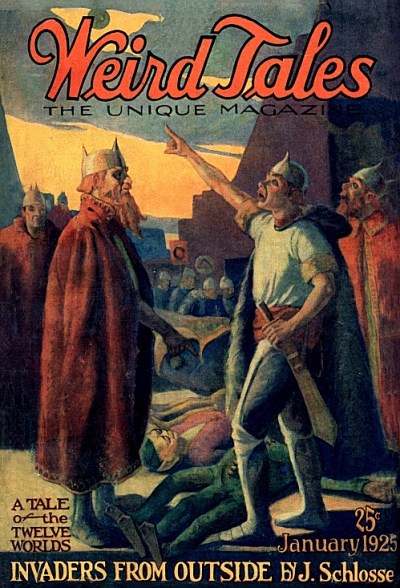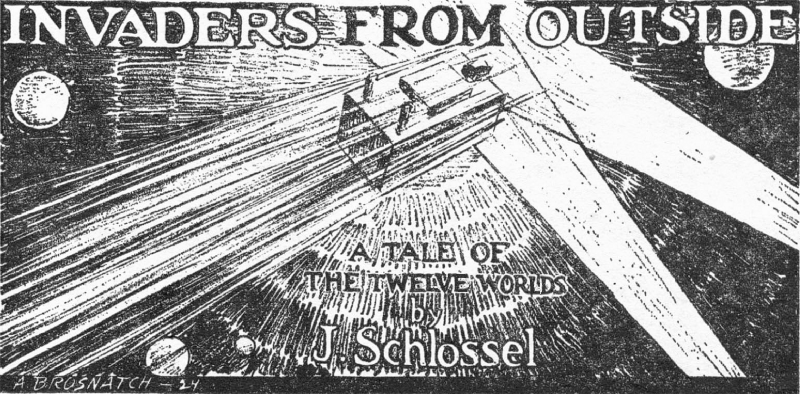INVADERS FROM OUTSIDE (1)
By:
September 11, 2023

J. Schlossel’s first story, “Invaders from Outside,” appeared in the January 1925 issue of Weird Tales. It was one of only six stories that he’d publish. SF historians agree that — with its solar system of inhabited planets, a council of worlds, and a space battle between fleets of ships — the story is an early example of “space opera.” HiLoBooks is pleased to serialize it here for HILOBROW’s readers.
ALL INSTALLMENTS: 1 | 2 | 3 | 4 | 5 | 6 | 7 | 8 | 9.

On every hand huge brilliant suns, single or multiple, flashed past with their retinue of small dark planets. Though there was no sound to mark their passage through the heavens, yet one felt that here, indeed, was a roaring inferno. Slowly and steadily did the solar system forge ahead through this veritable whirlpool of mighty blazing suns. It was nothing less than a miracle that the sun should be able to guide his charge of planets safely through this densely star-packed region near the center of the Milky Way. Even though the sun now shone with his greatest possible splendor, he was nothing but a tiny dwarf sun within a region where white-hot giants abounded.
The intelligent inhabitants of the solar system had for ages past been sweeping the heavens with their ponderous astronomical instruments, endeavoring to see farther, always farther. Their telescopes were gigantic. With the aid of those huge eyes that stared unblinkingly out into the starry regions of the night, they were able to record, chart, and compare nearly every star within the island universe of which they were an insignificant part.
It can almost be said that no phenomenon of the sky, great or small, escaped their keen-eyed vigilance. Hot glowing suns and cold dead worlds came equally under their curious, all- penetrating gaze. Their system of research was as near perfect as possible; besides, if one or more of the members of that great body known as the Scientific Society of the Twelve Confederate Worlds missed something through an unavoidable local condition, the other members did not.
Always did they keep watch, and though their instruments embraced the limits of the Milky Way yet a large number of cold, dark worlds had slipped in past their vigilance, and one of these was now hurtling at an enormous velocity straight toward the solar system.
Ignorant entirely of its coming, of the curious zigzag course it followed, or of its desperate purpose, the inhabitants of those twelve civilized worlds went on confidently with their researches and their dreams of eternal peace.
Peace? To the average inhabitant of the Twelve Confederate Worlds the meaning of the words peace and war was unknown. Those two words were met with only in the oldest archives on each planet. For the perfect and secure peace that the Twelve Confederate Worlds enjoyed had never been broken. They were the masters of the solar system. Peace was even older than the confederacy, and that was old beyond reckoning. No one knew or had the least conception when the Act of Confederation had been passed. It was forgotten in bottomless seas of the past.
Not even the industrious inhabitants of Mars, though their civilization had reached its apex two hundred and fifty thousand Martian years before and their written records extended back twice that far knew when that deathless compact had been agreed upon. Wrought deeply in the smooth, imperishable walls of adamant that surrounded the Moon’s capital city, Ishree, was the entire history of the ages that had so swiftly glided into the past: but even this greatest and oldest of all histories faded into a mass of crisscrossed lines of undecipherable script long in the ancient past dealing with that memorable event. The records of the other civilized worlds were just as illegible in regard to the period when the twelve worlds had confederated.
One hundred and twenty million miles out beyond the orbit of Mars was the orbit of the next world belonging to the Confederacy. It bore no name, but was called No. 5. It was situated between Mars and the Jovian system of habitated moons. And then came Jupiter with his four civilized moons, each of which was a member of the Confederacy: Callisto and Ganymede, the two largest; Europa and Io. the two smallest. Far out beyond the Jovian system, about four hundred million miles, lay the orbit of Saturn. Out there he was supreme. He owed allegiance to none but his parent, the Sun. He held continual sway over his five habitable moons: Japetus, the outermost; Titan, the largest: while Rhea, Dione, and Tethys came in order named. There were, of course, the moons of Uranus, but lie there was still in the savage state.
The thrill that the first few fearless Martians, experienced when they dared the unknown terrors of the vast airless seas in their flimsy crude craft can never be recalled. Bridging the space between the worlds was as common now as traveling from city to city. But there was no danger now, and neither was there any thrill in it. Even though the Confederacy was admitted to be old, very old, interplanetary travel was necessarily still older. It was the forerunner of the other.
RADIUM AGE PROTO-SF: “Radium Age” is Josh Glenn’s name for the nascent sf genre’s c. 1900–1935 era, a period which saw the discovery of radioactivity, i.e., the revelation that matter itself is constantly in movement — a fitting metaphor for the first decades of the 20th century, during which old scientific, religious, political, and social certainties were shattered. More info here.
SERIALIZED BY HILOBOOKS: James Parker’s Cocky the Fox | Annalee Newitz’s “The Great Oxygen Race” | Matthew Battles’s “Imago” | & many more original and reissued novels and stories.
